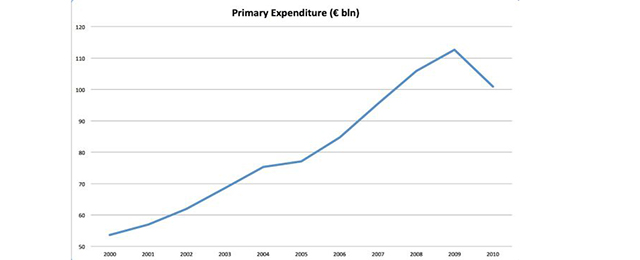Paradoxically, the committee will investigate the period from October 2009, which is effectively the phase when the country’s insolvency was managed rather than created. This adds to the plethora of indications to date that the country’s political personnel refuses to face reality. It also raises serious issues about the capacity of the same people to take Greece out of the economic and social catastrophe the last five years have brought.
A good starting point for the committee would be a regular publication of the Hellenic Statistics Authority, which contains extensive macro, and fiscal data of the Greek economy.
Greece entered the new millennium and the euro era with a debt of circa 141 billion euros, or just over 103 percent of its economy. To service that debt Greece needed about 10 billion euros per year, which in 2000 and 2001 represented approximately 7 percent of GDP.
With the effective interest rate – interest payments over the stock of debt – at just under 7 percent, the equation of the debt dynamics was pretty straightforward: Unless Greece was growing at phenomenal speeds and running consistent primary surpluses, it would soon find itself in trouble.
Greece’s political class soon started wasting the opportunities they were presented with. Greece became one of the fastest growing economies in the eurozone and membership of the single currency created the kind of euphoria that allowed Greece to start borrowing at a cost comparable to Germany, which brought total interest payments to 8.6 billion euros in 2003. In that year the primary surpluses of the previous three years disappeared and the overall budget deficit shot up to 5.7 percent of GDP.
Primary expenditure – spending before interest payments – rose rapidly throughout the decade, doubling from circa 53 billion euros in 2000 to 113 billion euros in 2009.
*Continue reading at MacroPolis. You can follow Yiannis Mouzakis on Twitter here.






Be the first to comment on "Greek economy: What in the world will we do without barbarians?"